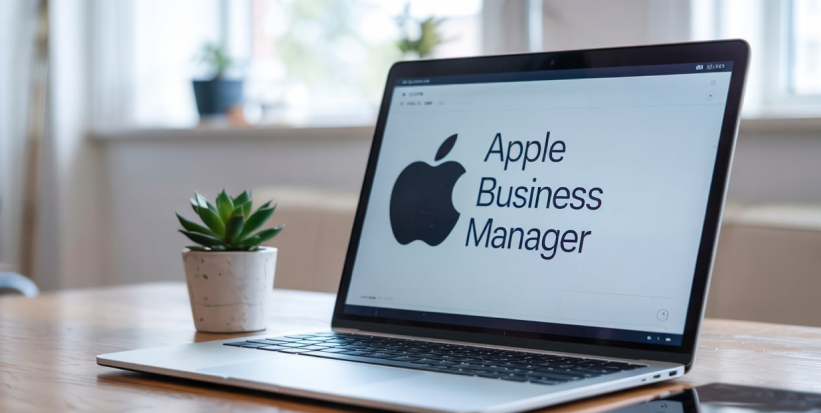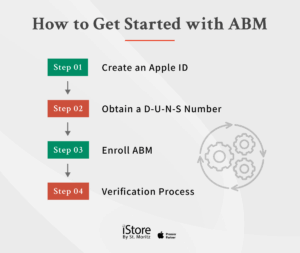
What is the Cost of Apple Business Manager?
Before diving into what Apple Business Manager (ABM) actually is, let’s address one of the most common questions up front: What does ABM cost? The good news is that Apple Business Manager is completely free. Apple offers it as a complimentary service to help organizations manage their Apple devices more efficiently. The only costs involved come from purchasing the actual hardware, apps, or other content you choose to use.
What is Apple Business Manager?
Apple Business Manager (ABM) is Apple’s official web-based platform designed to help businesses of all sizes deploy and manage their Apple devices, such as iPhones, iPads, Macs, and Apple TVs, in a streamlined, centralized way. IT teams or office managers primarily use it to automate device setup, manage apps and content, and integrate with mobile device management (MDM) solutions.
How to Get Started with ABM
To get started with Apple Business Manager (ABM), follow these steps:
1. Create a Dedicated Apple ID
Visit the Apple ID page to create a new ID using your organization’s email address. This account will serve as the administrator for ABM.
2. Obtain a D-U-N-S Number
Ensure your organization has a D-U-N-S Number, a unique identifier for businesses. You can check or request one through Apple’s D-U-N-S Number lookup tool.
3. Enroll in Apple Business Manager
Go to the official page for ABM and click “Sign up now.” Provide your organization’s legal name, D-U-N-S Number, website URL, and contact information for a verification contact (e.g., CEO or Director).
4. Verification Process
Apple will contact the verification contact to confirm the enrollment details. Once verified, you’ll receive an email to complete the setup of your ABM account.

Apple Business Essentials vs ABM
Apple Business Essentials (ABE) is often mentioned alongside ABM, and while the two are related, they serve different purposes. ABM is more of a foundational management tool, where your devices are registered and linked to your organization. However, it doesn’t handle the day-to-day management of those devices directly. For that, ABM works best when paired with an MDM system that lets you push configurations, apps, and updates remotely.
Apple Business Essentials, on the other hand, is a paid monthly subscription service ($24.99 per user) built for small to medium-sized businesses that want an all-in-one solution. It includes MDM capabilities, iCloud storage for users, priority Apple Support, and more. It’s ideal if your business doesn’t already have a third-party MDM provider or if you want a single, simplified platform for everything, like setup, support, and storage.
Features of ABM (Apple Business Manager)
Apple Business Manager (ABM) offers a range of features designed to simplify the deployment and management of Apple devices within organizations. Let’s take a look at what ABM can achieve.
Automated Device Enrollment (ADE)
Formerly known as DEP (Device Enrollment Program), Automated Device Enrollment allows your organization to streamline how Apple devices are set up and managed right out of the box. When a new device is turned on, it automatically connects to your MDM system and applies your company’s predefined settings, restrictions, and apps with no manual configuration needed.
This is especially useful for IT teams managing large deployments, as it saves time and ensures a consistent, secure setup. Only devices purchased through Apple or authorized resellers are eligible for this feature.
Apps and Books
Need to buy the same app for 50 employees? ABM lets you do that all at once. ABM enables businesses to purchase apps and books in volume from the App Store and distribute them efficiently across teams or departments. This feature is formerly known as the VPP (Volume Purchase Program). You can assign apps to users without requiring them to use personal Apple IDs and reclaim the licenses when employees leave or devices are reassigned.
You can even pre-load credits and manage how apps are distributed across different departments or offices, making bulk transactions smoother and allowing localized control for organizations with multiple branches.
Managed Apple IDs
Managed Apple IDs are designed for organizational use and differ from personal Apple IDs. These accounts allow employees to access Apple services such as iCloud, iWork, or Apple Business Essentials while giving IT administrators control over access and usage.
ABM can create these IDs automatically through integration with Microsoft Azure Active Directory or Google Workspace, or they can be manually created. They are essential for assigning roles, managing content, and ensuring data remains within the business environment.
Automated Device Setup
Through ABM and MDM integration, IT administrators can pre-configure device settings before employees even open the box. This includes skipping specific setup screens (like Siri, Touch ID, or Apple ID login), enforcing Wi-Fi configurations, or ensuring required business apps are automatically installed. It ensures devices are ready to go with minimal user input, reducing setup time and maintaining consistency across the organization.
Integration with MDM Solutions
ABM is designed to work alongside an MDM solution to deliver complete control over your Apple environment. You can link ABM to a third-party MDM provider and manage all aspects of your devices, from configurations and security policies to app installations and remote troubleshooting, within one unified system. This integration is essential for putting company policies into effect and keeping devices secure and compliant.
Role-Based Access Controls
Not everyone in your organization needs full access to ABM. With role assignments, you can give specific permissions based on a team member’s responsibilities. These roles include:
- Administrator – full control over settings and devices
- People Manager – manages user accounts and Apple IDs
- Device Enrollment Manager – handles device assignment and setup
- Content Manager – oversees app and book purchases
- Staff – limited access based on defined permission.
Custom App Distribution
ABM supports private app distribution if your organization develops its own apps, whether for internal tools, operations, or customer-facing services. This means you can deliver proprietary apps securely to employee devices without publishing them on the public App Store. It’s ideal for companies that need full control over app access and deployment, especially in industries like logistics, field service, or healthcare.
Unified Endpoint Management
ABM provides a centralized portal where IT can view and manage all enrolled Apple devices, regardless of model or location. This includes iPhones, iPads, MacBooks, iMacs, Apple TVs, and iPod Touches. The unified view simplifies device lifecycle management, allowing for better tracking, monitoring, and support across different use cases.
Inventory Management
ABM keeps a comprehensive record of all Apple devices registered under your organization. IT can track serial numbers, device models, and assignments, which makes it easier to audit usage, manage inventory, and plan upgrades. It serves as a central source of truth for all Apple hardware within the company.
Location Support
For companies operating in multiple cities or countries, ABM allows you to create separate locations within the platform. This helps delegate license and app management by region or branch. For example, a regional IT manager can oversee local app assignments and purchases without needing access to the full organization’s system.

FAQs for Apple Business Manager
What is the price of Apple Business Manager?
Apple Business Manager is completely free to use. There’s also no subscription fee or hidden cost involved. The only time you’ll spend money is when purchasing Apple devices, paid apps, or additional content through the platform.
Is it necessary to use Apple Business Manager?
You don’t have to use Apple Business Manager, but if your organization manages more than a handful of Apple devices, it’s a game-changer. It makes it way easier to deploy devices, purchase apps in bulk, and assign them automatically. Without it, a lot of things, like setting up new iPhones or distributing apps, can turn into manual, time-consuming tasks. So, while it’s optional, most IT teams find it essential once they scale up.
Can you use Apple Business Manager without MDM?
Technically, yes. You can use Apple Business Manager without a mobile device management (MDM) system. But you’ll only get basic features, like keeping track of your Apple serial numbers. To really get the most out of it, for example, automatic device enrollment, remote configuration, and streamlined updates, you’ll need to pair it with an MDM. Think of ABM as the foundation, and MDM as the tool that helps you actually build something useful on top of it.
What devices are supported by Apple Business Manager?
Apple Business Manager supports pretty much every modern Apple device your team might use. That includes iPhones, iPads (Air, mini, Pro), iPod Touch, all Mac models (like MacBook Air, MacBook Pro, iMac), and even current-generation Apple TV. Apple updates their documentation regularly, so it’s always smart to double-check their latest compatibility list just to make sure your specific models are covered.
Smarter Apple Solutions for Business—Powered by iStore by St. Moritz
Apple Business Manager is a free, web-based platform from Apple designed to simplify the deployment and management of Apple devices across organizations. While ABM itself doesn’t cost anything, its full potential is unlocked when paired with a powerful MDM solution, which may require a separate subscription or service fee, depending on the provider you choose.
If you’re looking to optimize your Apple environment, iStore by St. Moritz is here to support you. As an Apple Authorized Partner, we have extensive experience helping companies like CBS, Barnes & Noble, and the NYC Ballet stay productive and organized. Our team offers certified Apple device repairs using genuine parts, business leasing programs, and expert IT support.
Through our Business Program, you’ll gain access to volume pricing, priority service, zero-cost consultations, and flexible purchase order (PO) payment options. Whether you’re setting up a new workspace or scaling a fast-growing team, we provide end-to-end Apple support with the speed and precision your business deserves. Book a meeting today to explore how we can help you find the right solutions for your Apple needs.
